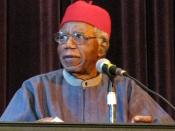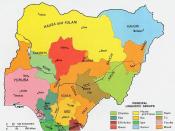One of the most highly known African authors today is the Nigerian born Chinua Achebe. Chinua Achebe?s main focus in his writings was to tell about the African experience, but in a completely different way previous authors wrote. The works of Achebe painted a picture of how life changed for Africans due to the impact of European culture on African society, and described the struggles of his people to free themselves from European influences. Many critics saw Chinua Achebe as a visionary, while others saw him as a voice for the Nigerian culture, giving him the reputation as the ?father of the African novel in English.? When England sent colonizers and missionaries to Africa, it had great affect on African tribal life, and on Chinua Achebe. Achebe became slightly interested in British culture, and began reading English writings; only to be disgusted with the message British authors were trying to get across.
Achebe learned that English authors saw Africans as ?inhumane savages? that needed to be saved (Carroll 68.) Angry with the English writings, Achebe decided to answer back by writing his first novel, Things Fall Apart, in 1958, to counteract the distortions of English literature about Africa. In Things Fall Apart, Achebe tells the story of an Ibo village of the late 1800?s and one of its great men, a warrior named Okonkwo. Okonkwo is a champion wrestler, a wealthy farmer, a husband to three wives, a title holder among his people, and a member of the select egwugwu, whose members impersonate ancestral spirits at tribal rituals. However life changes dramatically for the Ibo society and Okonkwo with the arrival of British colonizers and missionaries, also known as the ?white? man. The order of the Ibo society is disrupted with the appearance of the ?white? man in Africa and with the introduction of ?white? religion (Carroll 77-78.) Okonkwo, who is looked upon highly by his people, is unable to adapt to the changes that accompany colonialism. He tries to live the traditional Ibo life; however the arrival of the ?white? man into his society causes him to ?fall apart.? In the end of the story, Okonkwo, in frustration, kills an African employed by the British, then commits suicide which is a sin against the tradition to which he had clung to. The conflict in the novel, vested in Okonkwo, derives from the series of crushing blows which are leveled at traditional values by an alien and more powerful culture causing, in the end, the traditional society to fall apart (Carroll 82.) In Things Fall Apart, Achebe recreated the tragic consequences that took place due to the clash between the Ibo society and the ?white? man. By using a character such as Okonkwo, he showed how even the strong willed people of the Ibo society, were unable to overcome the British influences.
Traditional way of living for the Ibo society was rapidly changing in the early 1900?s due to European colonialism. Many Nigerians were being absorbed by the British and straying from their traditional beliefs and values (Abraham 46.) With the advent of the white man there was a loss of native values such as communal harmony, placing society above self, respect for the aged, and reverence for achievers, which resulted in the absence of self analysis and a stable code of ethics in the society of pre-Independent Nigeria. Lured by western education and well paying jobs, the youth of the country did not hesitate to stoop to the levels of immortality and dangerous permissiveness (Amuta19.) Disappointed by the younger generation of Nigerians, Chinua Achebe wrote No Longer at Ease, as an attempt to open the minds of non-traditional Nigerians. No Longer at Ease deals with the plight of this ?new? generation of Nigerians who have been exposed to education in the western world and therefore cut off from their roots in traditional society, only to discover upon their return, that the demands of tradition are still strong, and are hopelessly caught in the clash between the ?old? and the ?new?(Amuta 19.) In the novel, No Longer at Ease, Achebe expands his history of the Okonkwo family, for here the central character is Obi Okonkwo, grandson of the tragic hero of Things Fall Apart. Obi Okonkwo has been raised a Christian and has been educated at the university in England. Obi becomes a civil servant in the city of Lagos, hoping he can do all he can to help cleanse Nigeria of all its evils. While in Lagos, Obi realizes that ?new? Nigeria is not or ever going to be what he envisioned. The country has already advanced in corrupt practices such as bribe taking, which he too takes part in. Obi became what was a typical product of a modern era that mixes motives and values, a miserable amalgam, the offshoot of a weak, hybrid culture (Egudu 51.) Achebe felt that post colonial Nigeria had become corrupted by a government which was not the organic creation of its people, but an alien structure imposed upon them (Amuta 19.) Colonialism in Africa caused government officials, African or British, to take part in corrupt acts which damaged the routine of the African society. Achebe felt strong about the corruption going on his country and used No Longer at Ease to get his message across.
Another of Achebe?s novels that dealt with colonialism was Arrow of God. The novel takes place in the 1920?s after the British have established their presence in Nigeria. The ?arrow of god? mentioned in the title is Ezeulu, the chief priest of the god Ulu who is the patron deity of an Ibo village (Egudu 43.) As chief priest, Ezeulu is responsible for initiating the rituals that structure village life, a position vested with a great deal of power. In Ezeulu, Achebe presents a study in the loss of power (Egudu 46.) After his village rejects his advice to avoid war with a neighboring village, Ezeulu finds himself at odds with his own people but praised, however, by the British administrators. The British, seeking a candidate to install as village chieftain, make him an offer, which he refuses. Ezeulu, now caught in the middle with no allies, rapidly loses his grip on reality and slips into senility. In Arrow of God, Achebe uses Ezeulu as he used the Okonkwo family, strong willed men of tradition who cannot adapt, and are crushed by virtues in the war between the new, more worldly order, and the old conservative values of an isolated society (Carroll 96.) In some viewpoints, the three characters are portraying an African society losing its grip on its own reality, with nowhere to turn to for help.
As British influence on Nigeria grew, Achebe noticed the persistence of political corruption. In the novel, A Man of the People, Achebe casts a critical eye on African politics. The narrator of the story is Odili, a schoolteacher; the object of his scrutiny is Chief the Honorable M.A. Nanga, a member of Parliament. Nanga is a popular politician who has risen to the post of Minister of Culture in his West African homeland. At first, Odili is charmed by Nanga, but he eventually recognizes the extent of Nanga?s abuses and decides to oppose the minister in an election when Nanga seduces Odili?s girlfriend. Odili is beaten, both physically and politically, his appeal to the people heard but ignored (Abraham 48.) Despite his victory, Nanga, along with the rest of the government, is ousted by a military coup. Strangely soon after the novel was published in 1966, Nigeria itself was racked by a military coup d? etat led by young Igbo officers, and within six months, a second coup led by non-Igbo officers took power. In A Man of the People, Chinua Achebe tried to display how corrupt politics could ruin the African society that has been invaded by a wide range of values. He felt that the ?new? values have destroyed the traditional balance between the material and spiritual spheres of life (Abraham 48.) In the novel, he showed how these new values have corrupted the mind of Africans and tried to paint a picture to what was going to happen next to his homeland, if this way of life went on, for he felt his people?s growing inferiority complex and the leaders? disregard for the truth, would ruin his society.
When the military coup took power in Nigeria in 1966, Achebe feared the worst was ready to come to his homeland. Ethnic rivalries intensified and thousands of Igbos were killed or driven out of the north. In May 1967, the eastern region seceded as the new nation of Biafra. From then on, until the defeat of Biafra in January 1970, a bloody civil war was waged with high civilian casualties and widespread starvation. Achebe?s focus on his works still dealt with politics and values, but now he expressed deep emotions due to the war going on in his society. Achebe felt that no government, black or white, has the right to stigmatize and destroy groups of its own citizens without undermining the basis of its own existence (Innes 62.) Achebe didn?t write another novel after A Man of the People, for almost twenty one years, for he was exiled from Africa by the military dictatorship. However in 1987, Achebe wrote Anthills of the Savannah, to describe the political and social turmoil his country has faced. The story is set in an imaginary West African state and deals with three characters who have known each other for twenty five years, and in their arrogance, consider themselves to be their country. They are Sam, the military Head of State; Chris, the Commissioner of Information; and Ikem the editor of the National Gazette. They are all successful, well western-educated members of the elite, however know absolutely nothing about the country they govern (Innes 64.) Sam becomes President and abuses his power to great extents. Sam later feels his friends have become disloyal and sends to have them killed, for resisting his power. Finally, fed up with his abuse of power, a military coup eliminates Sam and entrusts Chris?s girlfriend Beatrice to return political sanity to the community. The end of the story shows how the group?s lack of knowledge of what their country really is like and their inability to communicate with the people has left them isolated and their country unlawful (Innes 64.) Achebe tried telling people not to trust or deal with the political people who are distant and cut off from society. He also dictates the point that bad politics and abuse of political power leads to a troubled society which takes place in Anthills of the Savannah, and took place in Nigeria. In the novel, Achebe wrote about the Nigeria he last saw before his exile to the United States. Due to military dictatorship, Achebe was forced out of the country, and even though he was banished from his country he still had a close relationship with the society he loved to write about.
Overall the works of Chinua Achebe played an enormous role not only in the lives of Africans, but the lives of human beings worldwide. His inspirational messages were not only insightful to African society but to all other countries that faced colonialism. One person who benefited greatly from Chinua Achebe?s messages was reggae musician Bob Marley. Marley wrote and sang many songs that dealt with colonialism in Jamaica, using Achebe as a guiding force. Songs such as ?Get up, Stand up,? and ?Redemption Song? were a few of his songs that portrayed the changing Jamaican society due to outside British influences. Chinua Achebe?s works gave people a different, yet more realistic view of life than what they read from European authors. Whether it was religion, politics, poverty, or even the role of women, Chinua Achebe pointed out the flaws in the world and wasn?t afraid to write about them, which gave hope to oppressed people around the world.





